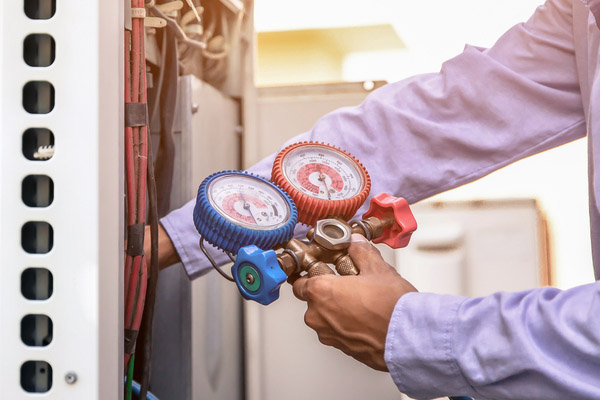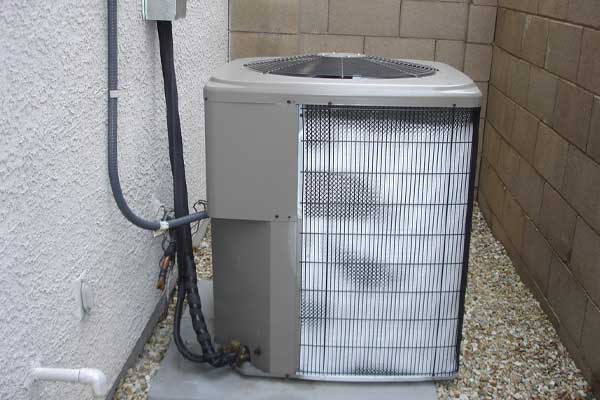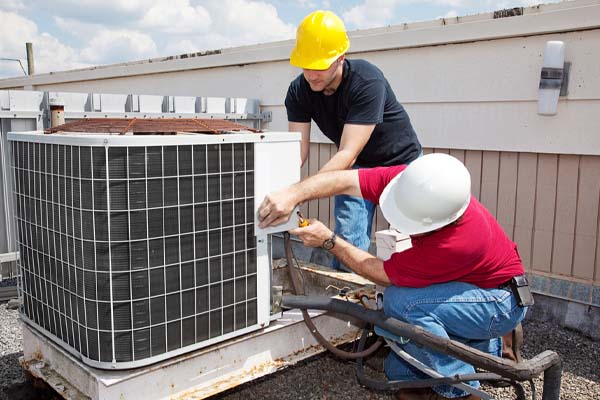Tell-Tale Signs Of An Overcharged Air Conditioner

Excessive refrigerant in air conditioning systems can be just as problematic as too little. Overcharged cooling systems can lead to damage over time because they struggle to process the excess refrigerant. To avoid issues and prolong the lifespan of your equipment, maintain refrigerant levels within their ideal parameters. Continue reading to discover overcharged AC symptoms and the dangers associated with this issue.
Tell-Tale Signs of An Overcharged Air Conditioner
Table of Contents
The refrigerant plays a vital role in the operation of a cooling system. It removes heat from the home, gradually reducing the indoor temperature during each cycle. While adding more refrigerant for faster cooling may be tempting, exceeding the designed capacity of the AC can lead to adverse consequences.
Dealing with refrigerant is a hazardous task that should only be handled by certified and experienced HVAC technicians. However, it is not uncommon for inexperienced individuals to make mistakes when charging refrigerant in an air conditioning system. As a homeowner, knowing the signs to look out for is important. Below are common indicators of an overcharged air conditioner:
High Energy Bills

Over time, as you use an air conditioner, you become accustomed to its energy requirements and the associated cost. While there may be some fluctuations, they are typically not substantial. If there is a sudden significant increase in your energy bill, it could indicate a problem with your AC. If this occurred following recent work on your cooling system, consider the possibility that your unit was overcharged with refrigerant.
Elevated Heat Discharge
Regular maintenance is a crucial aspect of owning an HVAC system. This includes tasks like clearing foliage around the outdoor unit to ensure proper airflow. Use this opportunity to inspect your equipment. While it is normal for the unit to release hot air, it could indicate an overworked system if you notice that the air feels unusually hotter than usual. Potential causes of this issue may include dirty air filters, clogged blowers, or excessive refrigerant.
Related Article: Common Air Conditioner Problems You May Face This Summer
Frozen Evaporator Coils

Air conditioners can become excessively cold, causing the coils to freeze up. Addressing this issue requires the expertise of an HVAC professional to determine the appropriate course of action. It can be perplexing for individuals without training because both insufficient and excessive refrigerant levels can contribute to ice formation. To accurately identify the underlying cause, contact a professional technician who can diagnose and resolve the issue effectively.
Noisy Air Conditioner Compressor
While it is common for the compressor to generate some noise, homeowners typically become accustomed to the normal sounds produced during startup and shutdown. They also become familiar with the hum of the compressor while it is in operation. However, if the compressor starts emitting unusual noises like loud squealing, it clearly indicates something is amiss. This could be attributed to the system struggling with excess high-pressure liquid refrigerant. In such cases, seek professional assistance to diagnose and rectify the issue promptly.
Related Article: How Does Your HVAC Affect Your Skin?
Sudden Cooling System Shutdown

When engineers design cooling systems, they consider potential hazards and incorporate safety switches that can trigger an automatic shutdown to prevent damage. Overcharging with refrigerant is one such hazard that can harm the air conditioner and activate this type of response. If you suspect your AC system has been overcharged, call an HVAC technician to check and diagnose the problem. Take the steps necessary to resolve it before restarting the unit.
Uneven Air Conditioner Pressure Levels
Uneven pressure levels around the cooling unit can indicate excess refrigerant, which is a problem that homeowners should watch out for. However, measuring pressure levels is not something that ordinary homeowners are likely to know how to do. If you suspect that excess refrigerant is the issue with your equipment, call a technician to perform an inspection. This is an objective way to get a conclusive answer and determine the best course of action.
Related Article: Benefits Of A Whole-Home Dehumidifier
How an AC Unit Gets Excessive Refrigerant
Insufficient refrigerant can be easily explained: your AC used to have a sufficient amount, but coolant leaks have slowly drained the substance. Fixing the leaks and recharging the system can restore it to normal operation. On the other hand, an overcharged AC can be caused by the following:
Faulty HVAC Installation

To avoid issues with refrigerant levels, rely on trusted professionals when installing a new HVAC system. HVAC experts play a vital role in determining the equipment’s performance, efficiency, and longevity. If an excessive amount of refrigerant is added during installation, it can lead to various problems and complications with your cooling system. Choose reputable professionals who understand the proper procedures and guidelines to ensure the optimal performance of your HVAC equipment.
Amateur Cooling System Repairs
Some homeowners may turn to amateurs for repairs instead of certified technicians to save money. However, the outcome of such repairs can be uncertain as these individuals may lack the knowledge and expertise of professionals. Some amateurs may even exacerbate the issue by overcharging the system when attempting to fix refrigerant leaks. The handling and disposal of refrigerants are legally restricted to licensed professionals. To ensure proper repairs and adherence to regulations, always seek assistance from certified technicians for any refrigerant-related issues.
Related Articles: HVAC Allergies: How Your HVAC System Can Limit Seasonal Allergies
Consequences of Having an Overcharged Air Conditioning Unit
- Poor Performance & Efficiency – Excess refrigerant in the cooling system can lead to poor performance, causing dissatisfaction among homeowners. The reduced ability to cool indoor spaces can be particularly frustrating during the summer. The system may struggle to convert refrigerant from gas to liquid and vice versa, leading to decreased efficiency. Correct the problem by removing the excess refrigerant through a trusted HVAC technician.
- Faulty Valves & Connecting Rods – When there is excess refrigerant in the system, there is a possibility that some of it may escape into the compressor’s cylinders while in its liquid state. This can result in damaged valves because they are not designed to handle such situations. The connecting rods can become faulty as well. To address this issue, have certified HVAC technicians promptly inspect and resolve the problem to prevent further deterioration. Delaying the resolution can exacerbate the situation, making it essential to take timely action.
- Compressor Motor Burnout – In the case of an overcharged cooling system, the liquid refrigerant may leak into the crankcase and mix with the motor oil. This can cause a significant increase in crankcase pressure. The compressor motor will be subjected to excessive stress, which it cannot sustain for an extended period. The motor may burn out, rendering it inoperable. When this happens, the only viable option would be to replace the entire cooling system. Addressing and resolving the overcharging issue promptly is crucial to prevent severe damage and the need for a complete system replacement.
What Homeowners Can Do
An overcharge of refrigerant in an air conditioner can pose risks and potential damage. If you suspect your AC unit is experiencing this issue, immediately turn it off and seek assistance from an experienced HVAC technician. A certified technician will have the knowledge and expertise to accurately calculate the correct refrigerant level and perform the necessary corrections. They will be able to address any damaged areas appropriately to ensure a prompt return to normal functioning. Taking swift action with professional help will mitigate the risks associated with an overcharged air conditioner.
Conclusion
Do not take shortcuts or use quick fixes for your air conditioner installations and repairs. While amateurs may offer lower prices, their lack of expertise can lead to future problems. Overcharging the system is a common issue that may arise from their unprofessional work, ultimately requiring professional intervention to rectify the situation. To avoid unnecessary headaches and ensure stress-free ownership, always use the services of certified technicians from the start. Doing so makes you confident that your AC unit is in capable hands, minimizing the risk of future complications.
Related Article: How To Deal With HVAC Ductwork Noise
Call Hart Home Comfort For All Of Your HVAC Requirements

Hart Home Comfort offers exceptional heating and cooling services in Nassau County, Suffolk County, and Queens, New York. Our team comprises highly skilled and certified technicians who provide top-notch HVAC tune-ups, repairs, installations, and replacements. With their extensive knowledge, training, and experience, you can trust us to service your HVAC system effectively.
We understand the importance of your budget, so we guarantee the most competitive heating and cooling service costs in the area. Our maintenance services are designed to enhance comfort, improve energy efficiency, and reduce home heating and cooling expenses. Whether you require an HVAC repair or a replacement system, our experts will guide you in selecting the best solution that fits your home and budget. We stand behind our HVAC work and offer a guarantee to ensure your satisfaction.
To schedule a service appointment, call Hart Home Comfort today. We are happy to provide free, in-home estimates to give you accurate and transparent pricing. Contact us now to experience the most superior heating and cooling services.
For any questions about what Hart Home Comfort can do for you, give us a call today. Click here to contact us now or call us at (631) 667-3200 to find out more! Click the link to view our service area.